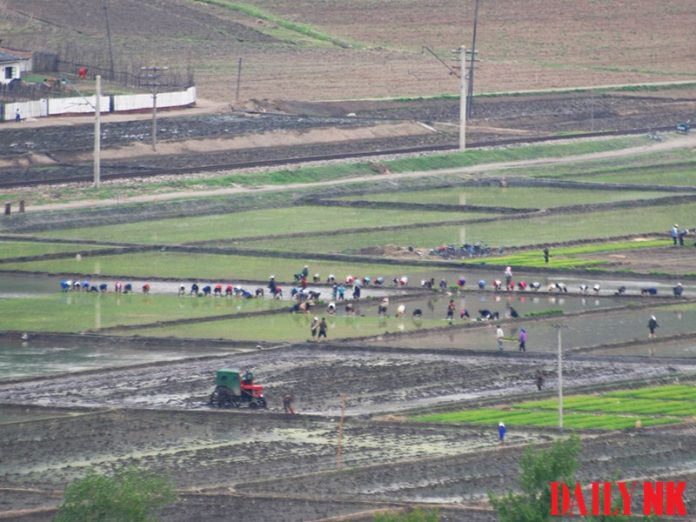
Every year in May and June in North Korea, a nationwide “rice planting battle” is carried out. During this period, men and women of all ages put aside their normal work and studies to complete farm labor under the hot sun. In an effort to complete the final stretch of this year’s “battle,” the North Korean authorities have mobilized residents to the country’s cooperative farms.
“Some of the regions in Ryanggang Province are reaching the finishing stages of the rice planting. Originally, all were supposed to be finished by June 12, but it rained in some areas, so it got pushed back a day and they have been working until today, and are expecting to finish,” an inside source said during a telephone call with Daily NK on June 13.
Regular farm workers are also in the middle of planting their own rice crops. “The farm managers secretly give the farmers small plots of land without permission from the state and a little extra time two days a week to manage it. Without any provisions from the state to give to the farmers over the course of the entire year, the farm managers decided on their own to provide this benefit to the farmers.”
A source in South Hamgyong Province reported that the rice planting season was coming to an end there as well. “The hardest place to do rice planting in the province – the fertile fields of the Kwangpo Duck Farm – is just now seeing an end to the rice planting process. It is impossible to bring machines into the area to do the work, so residents were mobilized from the downtown area,” she said.
“Ten years ago, the lands of the Kwangpo Duck Farm weren’t used for cultivation because they were too swampy, but they have since been converted to farmland. The rice produced here is used as grain for rice snacks given to the children of Hamhung during holidays as gifts. Every year, all residents are simultaneously mobilized to participate in the rice planting operation.”
She added that those residents who live in the outer reaches of the city “who don’t have bicycles have to walk for four hours over the hills to reach the farm,” and “even with a bicycle, it takes about three and a half hours.
“The bicycle riders and walkers alike are both exhausted by the time they arrive at the farm to work,” she said, explaining that the distance is far and “they have to work a long day in order to finish the rice planting, so they return at a very late time.”
The residents complain that the farm, since it used to be a swamp, still requires them to go in waist deep at times, and thus “it’s difficult to find the land that they are assigned to work,” the source said.
“Every year, they appeal to the managers to stop trying to cultivate the area.”




















